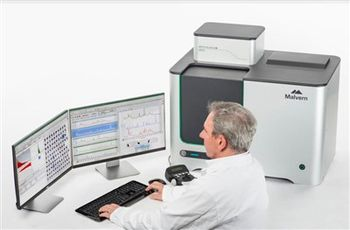
The new Morphologi® range of automated static imaging systems for particle characterization from Malvern Panalytical – Morphologi 4 and Morphologi 4-ID – has been unveiled. Built on the market-leading success of previous systems, the 2018 iF design award-winning Morphologi 4 and Morphologi 4-ID offer uniquely powerful tools for the rapid, automated component-specific measurement of particle size, shape and chemical composition. They deliver substantial improvements in measurement speed, image definition, and the range of materials that can be successfully analyzed. Offering sharper and faster particle size and shape measurements, the instruments add value to product development, troubleshooting and QC, particularly in analytical environments where a deeper understanding of a process and/or sample is required, such as during the development and processing of pharmaceuticals, metal powders and battery materials.
The Morphologi 4 is a fully automated system for characterizing particles ranging in size from less than one micron up to a millimeter and beyond. Compared to its predecessor, it offers quicker measurement – a time saving of around 25% – while delivering simpler, more intuitive method development and greater particle definition. A key feature is Sharp Edge, a new automated segmentation / thresholding algorithm that makes it easier to detect and define particles. Measurement sensitivity is further boosted by the 18 MP camera and by enclosure of the sample during imaging. These advances make it possible to accurately measure light-sensitive and low-contrast samples, such as proteins and certain mineral and chemical species, and deliver enhanced shape parameter sensitivity for all types of sample. This makes it possible to detect the subtle differences that are essential for rigorous process and product optimization and robust supply chain management.
The Morphologi 4-ID delivers Morphologically-Directed Raman Spectroscopy (MDRS®), integrating the static imaging capabilities of the Morphologi 4 with Raman spectroscopy to enable the component-specific morphological characterization of different chemical species in a blend. Offering significantly faster spectral acquisition times than the previous model – a time reduction of up to 80% – it also allows acquisition conditions to be customized to the sample. This enhanced control, combined with an extended spectral range, maximizes the range of materials that can be identified and/or differentiated within a mixture. The instrument is fully automated and is designed to allow both particle characterization scientists with limited spectroscopy experience, and more experienced spectroscopists to gain an in-depth understanding of their particulate samples.
Deborah Huck-Jones, Product Manager for Analytical Imaging at Malvern Panalytical comments: “These latest additions to Malvern Panalytical’s range of advanced analytical characterization technologies deliver greater detail in faster measurement times than ever before. Their applications in innovator and generic pharmaceutical development support the critical goal of speed to market. A particular benefit of MDRS to generics formulators is its ability to help demonstrate Q3 bioequivalence in vitro by ensuring the required physicochemical attributes of particles in the test formulation match those of the reference formulation, thus reducing or eliminating the need for clinical endpoint studies.”
Cathryn Langley, Associate Product Manager for Analytical Imaging at Malvern Panalytical, adds: “In many industrial applications, a specification based on size alone is no longer adequate. The flow and packing properties of metal powders and electrode materials, for example, are governed by particle shape, as well as size. This means that both parameters must be controlled to optimize performance, such as the properties of a finished injection-molded component, or the power and discharge characteristics of a battery. The new Morphologi systems make it quicker and easier to access accurate and component-specific particle size and shape data to develop a deeper understanding of such products, and of how to optimize and control their routine manufacture.”
